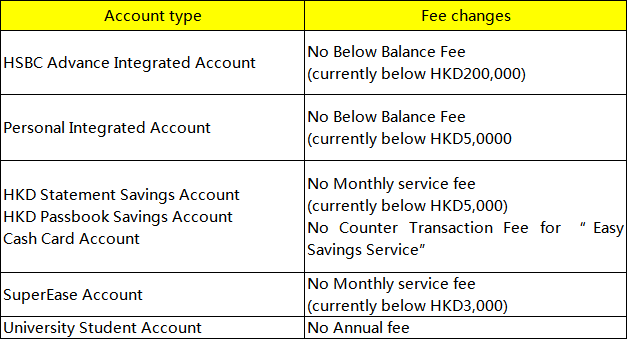01 HSBC
On June 21, it will scrap the minimum balance and below balance fee for personal integrated accounts that apply to 3 million customers in Hong Kong from August 1, HSBC said. https://www.hsbc.com.hk/accounts/remove-below-balance-fees/ © Image | HSBC
The following fees will be removed, effective from 1 August 2019:
02 BOCHK
Bank of China (Hong Kong) Limited (BOCHK) will remove service fees for personal integrated banking services and general banking accounts from August 1, 2019.
© Image | BOCHK
03 Standard Chartered Bank
Standard Chartered Bank will abolish its minimum-balance fee from August 1, the third major bank in a week to scrap the charge imposed on small depositors as Hong Kong’s traditional lenders prepare to fight off competition from virtual banks. Counter transaction service fee for click-account clients and low balance maintenance fee for non-packaged client’s deposit accounts also to be removed by it.
© Image | SCB These moves are related to the fact that there will be eight new virtual banks set up in Hong Kong in the fourth quarter of this year,” said Ben Kwong Man-bun, a director of brokerage KGI Asia.
“HSBC needs to act now to persuade its millions of customers to stay on or many of them may opt for joining the virtual banks which do not charge a fee for small depositors.”
© Image | Google The eight newly licensed virtual banks include two joint ventures separately led by the city’s two note-issuing banks – Bank of China (Hong Kong) and Standard Chartered Bank.
They also include a joint venture led by China’s first online insurer, ZhongAn Online P&C; a Xiaomi-AMTD Group venture called Insight fintech, and the Infinium consortium that includes Tencent Holdings, ICBC (Asia), and Hong Kong Exchanges and Clearing (HKEX).
© Image | Google
The other three are home-grown unicorn WeLab; mainland China’s second largest life insurer Ping An Insurance’s subsidiary Ping An OneConnect, and Ant Financial Services’ Ant SME Service.







Category: 新闻资讯
Nationwide Attention! Video Footage Reveals Midnight Assault!
Recently, a short surveillance video on Saturday shows a man was attacking a girl, sparking an online manhunt for the perpetrator.

© Image | WeChat

The footage shows the woman walking along a street looking at her phone when she is approached by a young man who abruptly hits her in the face. He continues to attack her, repeatedly punching and kicking her in the head before dragging her by the hair out of the camera frame.

The video, which lasts about 100 seconds, is time and date stamped at 12.44am on Saturday.
According to police, the video was first shared online by a group of people in Liaocheng, Shandong province, in eastern China on Monday, while a Weibo user from Meizhou, in the southern province of Guangdong, came forward to say the victim may be a relative.
According to online news portal Thepaper.cn, other social media users said they believed the man may be speaking with a Yangjiang dialect.


© Image | WeChat
Police and government officials in each of these cities ruled out the attack taking place there, as no locations matched the one shown in the video.

Certainly, this horror attack on the woman caught on camera has caused an extremely drastic response among netizens.


© Image | Weibo
Police in Dalian, a city in the northeastern Chinese province of Liaoning, have identified the victim of a vicious assault.
The woman, aged 29, called police after the attack and was treated in hospital for “soft tissue damage”, according to a statement by Dalian police on Tuesday.
At the midnight of June 25, @大连公安 informed this vicious attack, claiming that they have arrested the suspect.


© Image | Weibo
At present, the suspect has confessed to his criminal acts, and police investigations into the case are continuing.

© Image | WeChat
We Want to See the Justice Eventually Done On July 8th!
Brendt Christensen, a former University of Illinois at Urbana-Champaign (UIUC) doctoral student, was found guilty Monday of kidnapping and killing Zhang Yingying, a visiting Chinese scholar at UIUC in 2017.
A 12-member jury at a federal court of Peoria in the U.S. state of Illinois unanimously ruled that Christensen was guilty on all three counts of the charge against him, namely kidnapping resulting in the death of Zhang in 2017; and two counts of making false statements to FBI.
It took less than two hours for the jury to make the decision after the prosecutor and the defense finished their closing statements on Monday morning.

© Image | Google
In a following press conference outside the courtroom, Zhang Ronggao, father of Zhang Yingying, told Xinhua he was satisfied with the verdict, and further hoped the justice will be done in the upcoming penalty sentence, which is scheduled on July 8 when the same jury will decide whether Christensen deserves the death penalty.
Zhang’s mother broke into tears standing beside Zhang’s father.
Zhang, a 26-year-old visiting Chinese scholar, went missing on June 9, 2017, after getting into a black Saturn Astra about five blocks from where she got off a bus on her way to an apartment complex to sign a lease.
Christensen was arrested on June 30, 2017, after being caught on tape pointing out people he described as “ideal victims” during a vigil in Zhang’s honor. But he pleaded not guilty.

Saudi Arabia Charges Foreigners $213,000 for Permanent Residency
Saudi Arabia has opened applications for a permanent residency program designed to attract foreign investment to the kingdom, but it will cost a hefty 800,000 riyals ($213,000).


There’s also a cheaper option, with a one-year renewable residency costing 100,000 riyals. The so-called premium residencies will allow foreigners to buy the property and do business without a Saudi sponsor, switch jobs and exit the kingdom easily and sponsor visas for family members, according to the website for registrations.

© Image | Google
As well as the paying the high fee, applicants must be at least 21 years old, prove financial solvency and have a clean criminal record and bill of health.

The program approved in May is the latest sign of how the quest for non-oil revenue is prompting Gulf nations to rethink the role of foreigners in their societies.
It’s a landmark move in a region where many overseas workers are subject to some of the world’s most restrictive residency rules.

© Image | Google
The United Arab Emirates approved a plan to allow wealthy foreigners to apply for a 10-year stay, while Qatar passed a law that’ll grant some permanent residencies.
The idea for a long-term Saudi residency program was first floated in 2016 by Crown Prince Mohammed bin Salman, as a part of his plan to reduce the economy’s reliance on oil and boost foreign direct investment.

At the time, he estimated the program would generate about $10 billion in annual revenue by 2020.
While Saudi Arabia is seeking to encourage the affluent to stay, monthly fees imposed on foreign workers and their families, along with sluggish economic growth, have prompted hundreds of thousands of expatriates to leave. The levy is designed to spur private businesses to hire Saudi nationals.

© Image | Google
The new permanent residency system could prove controversial among Saudis at a time when unemployment is at 12.5%, nationalism is surging and xenophobia is not uncommon.
Slogans like “Saudi is for Saudis” are common on social media, and a recent opinion piece in a newspaper argued that the kingdom could deport all its Lebanese residents without consequence.
Share to let your friends know!




